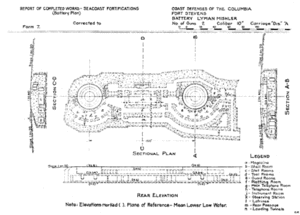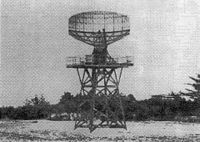Battery Mishler: Difference between revisions
John Stanton (talk | contribs) No edit summary |
John Stanton (talk | contribs) No edit summary |
||
| Line 8: | Line 8: | ||
A concrete [[:Category:Endicott Period Batteries|Endicott Period]] battery facing the mouth of the Columbia River with 2, 10" rifles on disappearing carriages. The battery was unusual in that had two 360 degree emplacements that allowed full coverage of the area. | A concrete [[:Category:Endicott Period Batteries|Endicott Period]] battery facing the mouth of the Columbia River with 2, 10" rifles on disappearing carriages. The battery was unusual in that had two 360 degree emplacements that allowed full coverage of the area. | ||
Construction began 28 Oct | Construction began 28 Oct 1898 and both emplacements were turned over to the Commanding Officer of Fort Stevens on 28 Jun 1900. The two 10" rifles arrived in November 1899. One carriage arrive on 18 Apr 1900 but the remaining carriage was not in place until August 1901. In December 1901 the guns were successfully test fired. | ||
Legend has it that one of the early firings of one of these rifles killed six of the crew. The problem was that the guns were surrounded by thick walls on all sides in the circular gun pits. This would create a concussion effect when the gun was fired. If crew members did not protect themselves from the concussion effect by jumping and saying "ahh" when firing the gun, they could suffer major internal injuries and shattered bones. | Legend has it that one of the early firings of one of these rifles killed six of the crew. The problem was that the guns were surrounded by thick walls on all sides in the circular gun pits. This would create a concussion effect when the gun was fired. If crew members did not protect themselves from the concussion effect by jumping and saying "ahh" when firing the gun, they could suffer major internal injuries and shattered bones. | ||
Revision as of 16:18, 24 August 2008
Battery Mishler (1900-1941) - Battery Lyman Mishler was built at Fort Stevens between Aug 1898 and Jun 1900 and was transferred for service 28 Jun 1900. Battery Mishler was named in 1906 for Bvt. Capt. Lyman Mishler who was killed in action 21 Feb 1862 at Valverde NM during the U.S. Civil War.


Battery Mishler History
A concrete Endicott Period battery facing the mouth of the Columbia River with 2, 10" rifles on disappearing carriages. The battery was unusual in that had two 360 degree emplacements that allowed full coverage of the area.
Construction began 28 Oct 1898 and both emplacements were turned over to the Commanding Officer of Fort Stevens on 28 Jun 1900. The two 10" rifles arrived in November 1899. One carriage arrive on 18 Apr 1900 but the remaining carriage was not in place until August 1901. In December 1901 the guns were successfully test fired.
Legend has it that one of the early firings of one of these rifles killed six of the crew. The problem was that the guns were surrounded by thick walls on all sides in the circular gun pits. This would create a concussion effect when the gun was fired. If crew members did not protect themselves from the concussion effect by jumping and saying "ahh" when firing the gun, they could suffer major internal injuries and shattered bones.
There was a casualty at Battery Mishler. One of the gun crew did not make it fast enough to the enclaves in the wall when the gun was fired. The recoil of the gun hit the crew member and killed him. This was the only confirmed military causality at Fort Stevens.
At the beginning of World War II in 1941 both emplacements and the rifles were covered with timbers and then with earth and sod to camouflaged the battery. The control structure in the lower gallery was sealed and pressed into service as a center for controlling the defense of the Columbia river entrance. After the war in 1946-47 the rifles and carriages were scrapped. A concrete roof that still exists was built over the two emplacements. This is the only example of this type of battery left in the world. Battery Heileman at Fort San Jacinto had one ARF but the battery was destroyed to make way for a hotel.

In Sep 1950, just after the start of the Korean War, the Air Force established Fort Stevens Air Force Station (759th AC&W) on the Fort Steven post. The Air Force Station provided long range radar surveillance using CPS-5D and TPS-1B radar sets mounted on concrete roof of Battery Mishler. The unit headquarters was located in the "Guard House" and control structure of Battery Mishler served as the operations and maintenance center for the squadron.
Fort Stevens Air Force Station moved to Naselle AFS in Washington Feb 1952.
| Empl No |
Caliber Type |
Barrel Length |
Model | Serial No |
Manufacturer | Carriage | Service Dates |
Notes | |
|---|---|---|---|---|---|---|---|---|---|
| 1 | 10" Rifle | 367.25" | M1888MII | 33 | Bethlehem | Disappearing Carriage A.R.F., M1896, #2, Watertown |
1900-1941 | ||
| 2 | 10" Rifle | 367.25" | M1888MII | 32 | Bethlehem | Disappearing Carriage A.R.F., M1896, #3, Watertown |
1900-1941 | ||
| Source: Coast Defense Study Group | |||||||||

Current Status
The Battery is in poor condition and not accessible to the general public except by guided tour.
|
{"selectable":false,"width":"500"} |
Location: On Fort Stevens, Oregon Maps & Images Lat: 46.207202 Long: -123.970494 |
Sources:
- Coastal Defense Study Group
- Hanft, Marshall, Fort Stevens: Oregon's defender at the river of the West, Your Town Press, 1980, pages 145-149, 260-261
Links:
Visited: 22 Aug 2008, 18 May 2008
Battery Mishler Picture Gallery
|
Click on the picture to see a larger version. Contribute additional pictures - the more the better! |